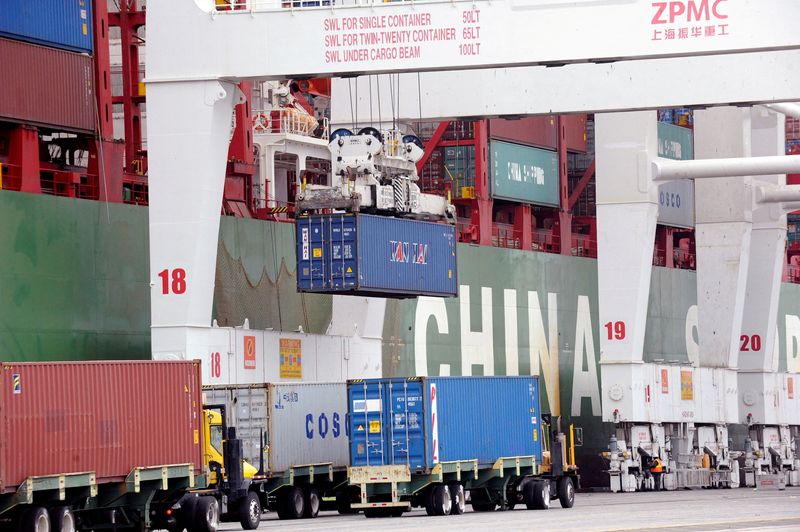By David Shepardson and David Lawder
WASHINGTON (Reuters) -Some of the steep U.S. tariff increases on an array of Chinese imports, including electric vehicles and their batteries, computer chips and medical products, will take effect on Aug. 1, the U.S. Trade Representative's office said on Wednesday.
President Joe Biden will keep tariffs put in place by his Republican predecessor Donald Trump while ratcheting up others, including a quadrupling of import duties on Chinese EVs to over 100% and a doubling of semiconductor duties to 50%.
USTR said in a federal notice that a 30-day public comment period will close on June 28. The trade agency is seeking comments on the effects of the proposed tariff increases on the U.S. economy, including consumers, and on whether a proposed 25% duty on medical masks, gloves and a planned 50% tariff on syringes should be higher.
The United States in 2023 imported nearly $640 million of gloves, masks and syringes from China that will be affected by the new measures.
The notice also provides specific tariff codes for some 387 product categories affected along with new duty rates and implementation dates. Tariffs targeted to start in 2025 and 2026 will start on Jan. 1 for those years, USTR said.
The proposed Chinese tariff increases include "products targeted by China for dominance, or are products in sectors where the United States has recently made significant investments."
Washington is investing hundreds of billions of dollars in clean energy tax subsidies to develop U.S. EV, solar and other new industries, and has said China's state-driven excess production capacity in these sectors threatens the viability of U.S. companies. The tariffs are meant to protect American jobs from a feared flood of cheap Chinese imports.
The new measures affect $18 billion in current imported Chinese goods including steel and aluminum, semiconductors, electric vehicles, critical minerals, solar cells and cranes, the White House said. The EV figure may have more political than practical impact in the U.S., which imports few Chinese EVs because of prior vehicle tariffs.
BATTERIES LOOM LARGE
The largest two categories, making up $13.2 billion of the targeted imports from China in 2023, are lithium-ion batteries, according to U.S. Census Bureau data.
Duties of 25% are due to start in 2026 on the $10.9 billion non-vehicle lithium-ion battery category, which has grown quickly and is now the third-largest U.S. import category from China after smartphones and personal computers.
The U.S. imported $427 billion in goods from China in 2023 and exported $148 billion to the world's No. 2 economy, a trade gap that has persisted for decades and become an ever more sensitive subject in Washington.
The Retail Industry Leaders Association said it was evaluating the list of specific products subject to new tariffs and added that "retailers are growing increasingly anxious about the current product exclusions that are set to expire at the end of the month."
U.S. Trade Representative Katherine Tai has said the revised tariffs were justified because China was stealing U.S. intellectual property. Tai has also recommended tariff exclusions for hundreds of industrial machinery import categories from China, including solar product manufacturing equipment.
Tai said Wednesday the formal notice is an important step in making "substantial tariff increases on targeted, strategic products."
The Chinese Embassy in Washington said China's government will "take all measures necessary to defend our rights and interests." It said the tariff hike "will not only disrupt normal economic and trade cooperation between China and the U.S., but also significantly drive up the cost of imported goods, inflict more loss on American companies and consumers, and make the U.S. consumers pay even more."
On Sunday, Beijing announced a new anti-dumping probe on certain industrial plastics from the U.S., Europe, Japan and Taiwan.
USTR said it would provide details on how companies could apply for machinery exclusions from the tariffs in a separate notice. But it said any exclusions granted would be backdated to start on Wednesday and end on May 31, 2025.

U.S. Treasury Secretary Janet Yellen said on Tuesday she was pushing for G7 allies at a finance ministers meeting in Italy to jointly push back on China's industrial policies, although she said she was not asking them to mirror the new U.S. tariffs.
The G7 industrial democracies are the U.S., Japan, Germany, France, Britain, Italy and Canada.